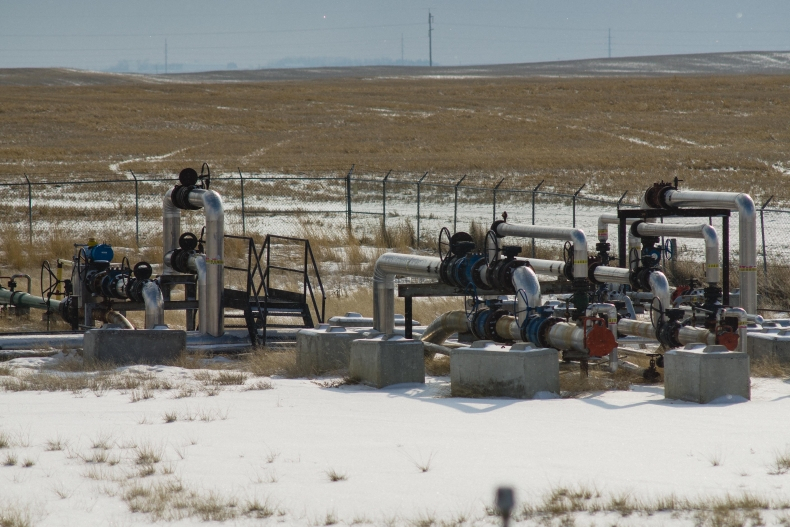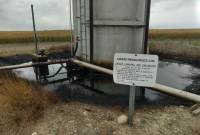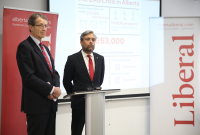Support strong Canadian climate journalism for 2025
Last week, National Observer, Global News and the Toronto Star reported that Alberta’s Energy Regulator (AER), in a presentation to a private audience earlier this year, estimated the cost to clean up the province’s oil and gas sites at $260 billion. This figure is $200 billion higher than what was previously been made public. Even worse, the presentation notes that as more data surfaces, the number is expected to grow.
The AER quickly issued an unconvincing press release, blandly stating that its senior executive had somehow made a mistake and the liability number was (only) $58 billion. It appears the actors then decided far too quickly to move on after a rare window into the unpleasant situation Alberta finds itself in – its better to simply not talk about it.
Anger among many Albertans that successive governments have let this issue worsen has not led to accountability – yet. You would think that the revelation of a $260 billion in off the books environmental debt against a mere $1.6 billion in security deposits collected might garner more sustained interest. Yet headlines the next day in Edmonton focused on a $79 per household proposed city tax hike and not the quarter trillion dollar elephant in the room.
It’s difficult to imagine companies investing such a large sum of money in reclamation efforts and even more inconceivable that this would take place when revenues dry up. If companies walk away, Alberta taxpayers could ultimately be on the hook for the cleanup, which would amount to about $150,000 per household or more than six times Alberta’s current provincial debt. That’s why it is critical that Alberta strengthens its regulatory regime to ensure that companies that reap the benefits of the province’s natural resources are also responsible for the cleanup.
United Conservative Party avoided the issue
The official opposition, the United Conservative Party, which will likely campaign around financial responsibility and the deficit in Alberta’s 2019 election, curiously declined to comment on the $260 billion liability – an issue of financial mismanagement that dwarfs all others. What’s more, party leader Jason Kenney signaled that he wants to appoint a “minister of deregulation” and undo environmental policy advancements. To go back to the old way of doing things and relax already weak requirements is the opposite of what needs to be done and would expose Albertans to further financial risks of this inherited problem. Such regression in policy is illogical.
It is also troubling that the smoking gun on the need to protect citizens and reform Alberta’s weak liability system, was met in large part with silence. If nothing else, it might temporarily quiet the usual refrain about Alberta’s “world class” regulatory system and cause a moment’s pause in industry and opposition arguments that the oil and gas industry needs even more deregulation.
Some have speculated that the cognitive dissonance is because Albertans know they are stuck between a rock and a hard place. Is it easier to accept that the 1.3 trillion litres of toxic waste from oil sands tailings ponds, now covering 220km2, will never be properly cleaned up? Is it plausible that the tens of thousands of abandoned wells be left for taxpayers and landowners to deal with? Are we going to turn a blind eye to the tens of thousands of linear disturbances and seismic lines that crisscross the boreal forest? Are we giving up on Albertans who risk their lands being contaminated and devalued in the absence of appropriate reclamation after a well dries up?
What is needed is leadership to ensure Albertans are not inheriting the environmental liability of resource development. Instead of deregulation, governments that truly represent their citizens should introduce safeguards to protect taxpayers and landowners. They should introduce measures to ensure that companies which profit from the province’s natural resources are finally required to return the landscape to its original state. Smart investors will also take the cleanup liability and its associated risks into account, and as more information becomes public, the status quo will become less and less tenable.
Amin Asadollahi is the Executive Director of Canadian policy research firm Horizon Advisors.
If you’ve made it this far, you must care about in-depth and responsible journalism. How about supporting more articles like this one. Get 60% off during our Black Friday sale (only $55.99, reg. $139.99) for access to Canada’s top investigations on energy, climate, the environment and more. If you’re already a subscriber, please consider gifting a subscription, just in time for the holiday season.






Comments
What does the environment department in Ottawa intend to do about this? Give big oil and gas more concessions?....and put their hands in our pockets yet again.
Every day I become more convinced that the role of "modern" governments is simply to facilitate industry's rape of the earth, pillage of our natural resources, and theft of our future.
So very sad but you speak the truth.